FNSINC504 - Ethical Frameworks & Principles in Accounting Decisions
VerifiedAdded on 2023/03/23
|14
|2726
|82
Report
AI Summary
This report examines the crucial relationship between accountability and ethics within organizations, highlighting how this connection is often overlooked. It identifies key ethical issues impacting organizations, from employees to management and stakeholders, and outlines ethical principles relevant to business conduct. The report emphasizes the importance of regulatory measures to prevent unethical behavior in the workplace and suggests disciplinary actions for policy violations. Furthermore, it discusses the potential consequences of unaddressed unethical behavior and proposes a response and implementation plan for ethical breaches within organizations, covering topics such as avoiding pressure on employees, encouraging competence through training and benchmarking, moral responsibility, team mentality, clear expectations, and the APES 110 code of ethics, including integrity, objectivity, due care, confidentiality, and professional behavior.
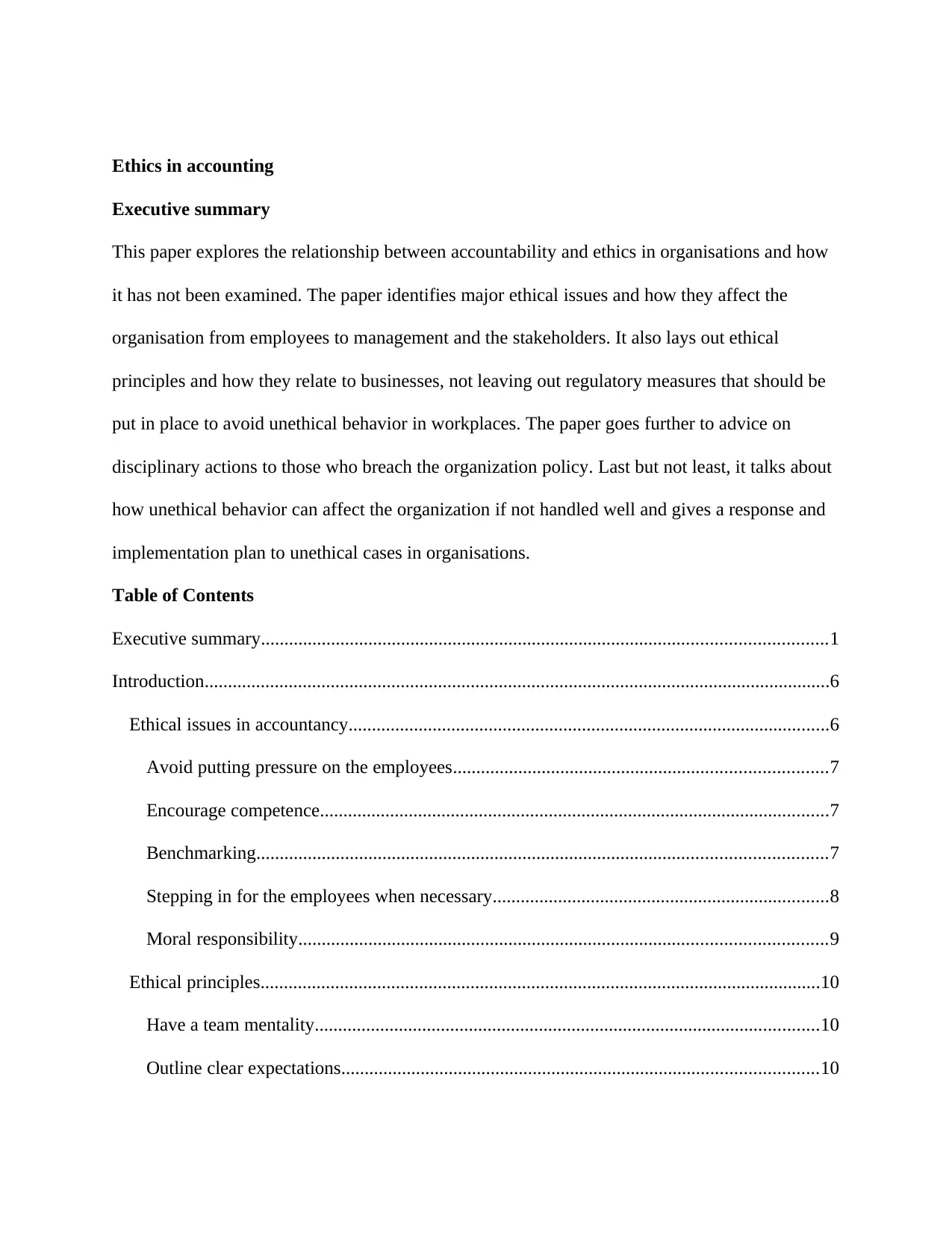
Ethics in accounting
Executive summary
This paper explores the relationship between accountability and ethics in organisations and how
it has not been examined. The paper identifies major ethical issues and how they affect the
organisation from employees to management and the stakeholders. It also lays out ethical
principles and how they relate to businesses, not leaving out regulatory measures that should be
put in place to avoid unethical behavior in workplaces. The paper goes further to advice on
disciplinary actions to those who breach the organization policy. Last but not least, it talks about
how unethical behavior can affect the organization if not handled well and gives a response and
implementation plan to unethical cases in organisations.
Table of Contents
Executive summary.........................................................................................................................1
Introduction......................................................................................................................................6
Ethical issues in accountancy.......................................................................................................6
Avoid putting pressure on the employees................................................................................7
Encourage competence.............................................................................................................7
Benchmarking..........................................................................................................................7
Stepping in for the employees when necessary........................................................................8
Moral responsibility.................................................................................................................9
Ethical principles........................................................................................................................10
Have a team mentality............................................................................................................10
Outline clear expectations......................................................................................................10
Executive summary
This paper explores the relationship between accountability and ethics in organisations and how
it has not been examined. The paper identifies major ethical issues and how they affect the
organisation from employees to management and the stakeholders. It also lays out ethical
principles and how they relate to businesses, not leaving out regulatory measures that should be
put in place to avoid unethical behavior in workplaces. The paper goes further to advice on
disciplinary actions to those who breach the organization policy. Last but not least, it talks about
how unethical behavior can affect the organization if not handled well and gives a response and
implementation plan to unethical cases in organisations.
Table of Contents
Executive summary.........................................................................................................................1
Introduction......................................................................................................................................6
Ethical issues in accountancy.......................................................................................................6
Avoid putting pressure on the employees................................................................................7
Encourage competence.............................................................................................................7
Benchmarking..........................................................................................................................7
Stepping in for the employees when necessary........................................................................8
Moral responsibility.................................................................................................................9
Ethical principles........................................................................................................................10
Have a team mentality............................................................................................................10
Outline clear expectations......................................................................................................10
Paraphrase This Document
Need a fresh take? Get an instant paraphrase of this document with our AI Paraphraser
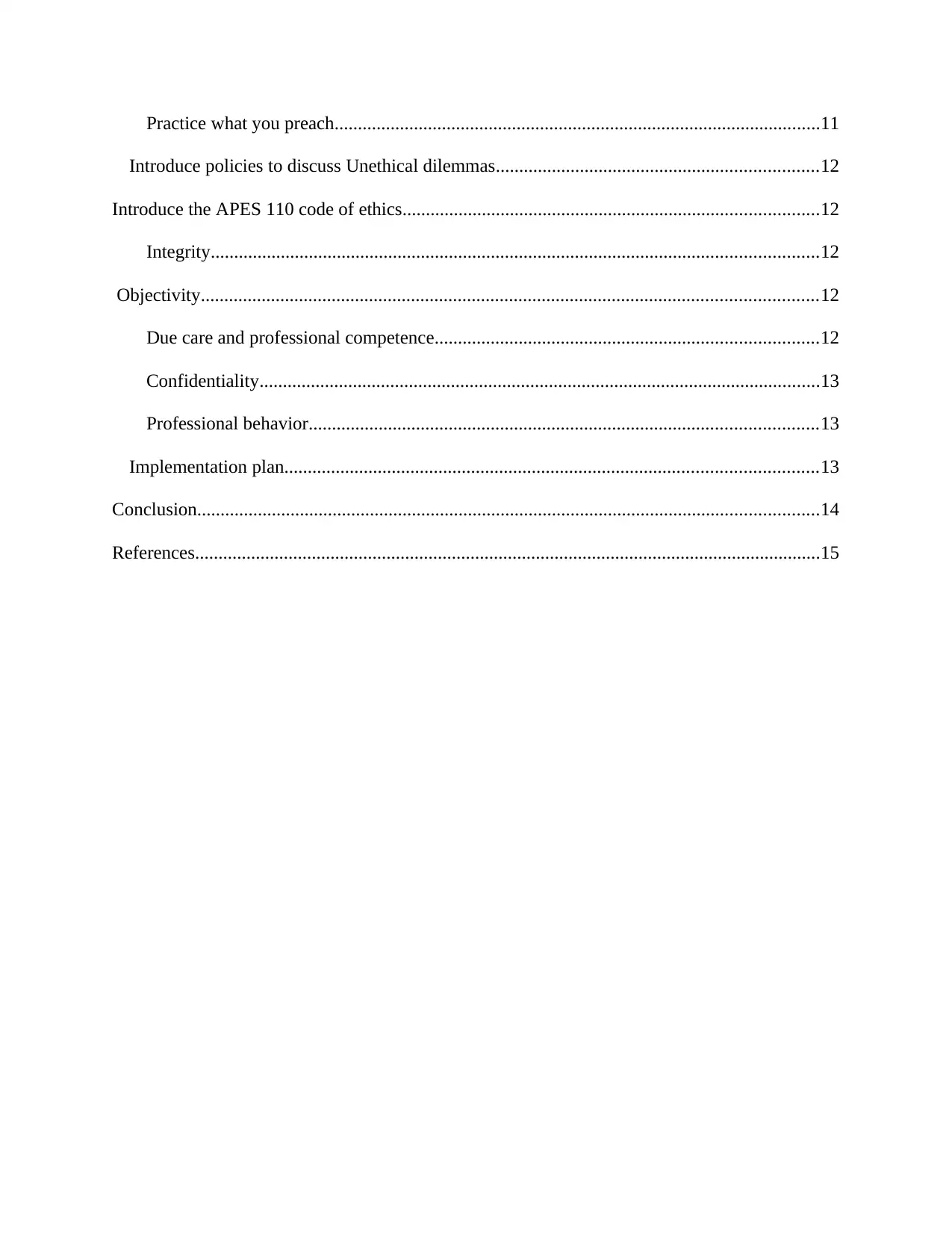
Practice what you preach........................................................................................................11
Introduce policies to discuss Unethical dilemmas.....................................................................12
Introduce the APES 110 code of ethics.........................................................................................12
Integrity..................................................................................................................................12
Objectivity....................................................................................................................................12
Due care and professional competence..................................................................................12
Confidentiality........................................................................................................................13
Professional behavior.............................................................................................................13
Implementation plan..................................................................................................................13
Conclusion.....................................................................................................................................14
References......................................................................................................................................15
Introduce policies to discuss Unethical dilemmas.....................................................................12
Introduce the APES 110 code of ethics.........................................................................................12
Integrity..................................................................................................................................12
Objectivity....................................................................................................................................12
Due care and professional competence..................................................................................12
Confidentiality........................................................................................................................13
Professional behavior.............................................................................................................13
Implementation plan..................................................................................................................13
Conclusion.....................................................................................................................................14
References......................................................................................................................................15

⊘ This is a preview!⊘
Do you want full access?
Subscribe today to unlock all pages.

Trusted by 1+ million students worldwide
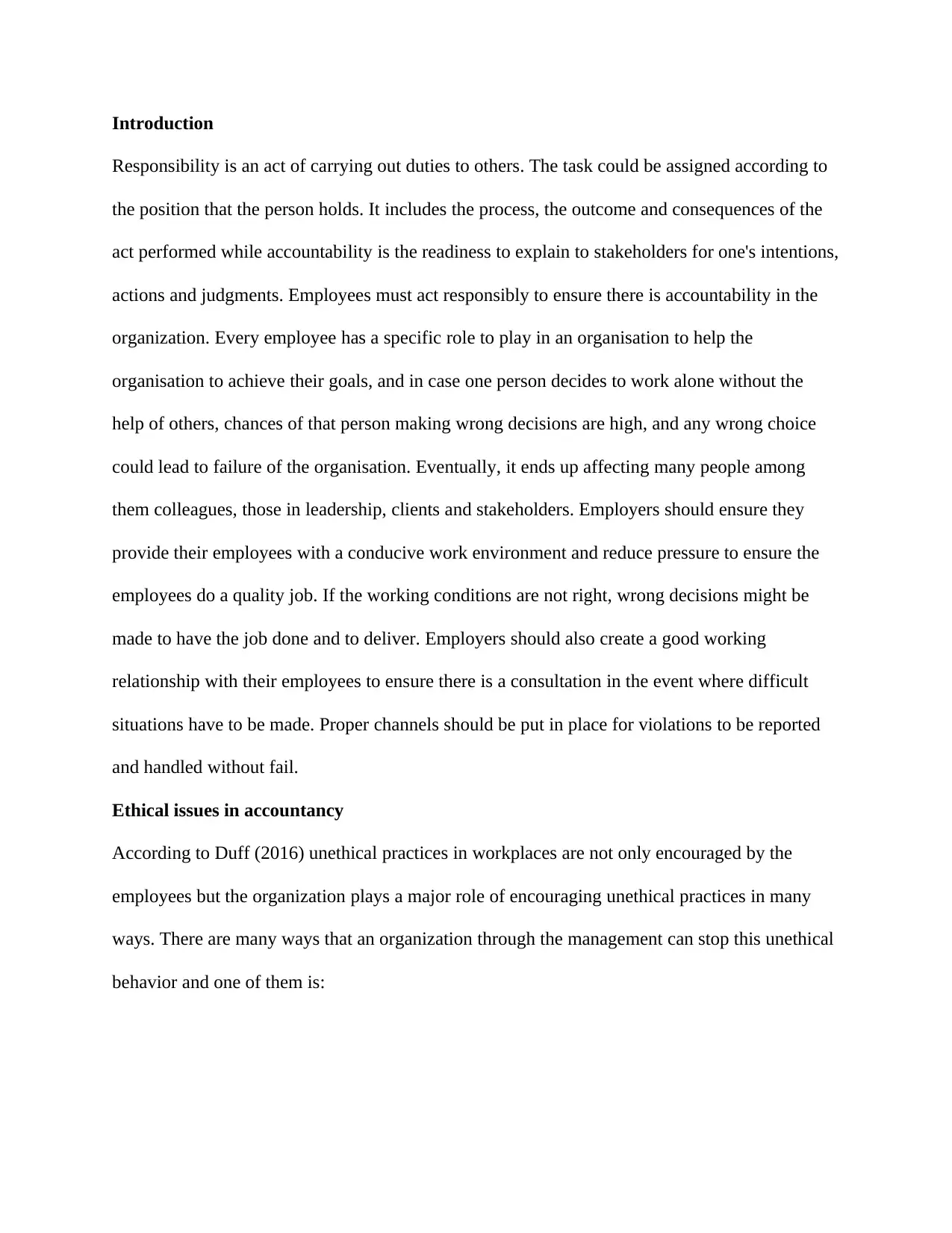
Introduction
Responsibility is an act of carrying out duties to others. The task could be assigned according to
the position that the person holds. It includes the process, the outcome and consequences of the
act performed while accountability is the readiness to explain to stakeholders for one's intentions,
actions and judgments. Employees must act responsibly to ensure there is accountability in the
organization. Every employee has a specific role to play in an organisation to help the
organisation to achieve their goals, and in case one person decides to work alone without the
help of others, chances of that person making wrong decisions are high, and any wrong choice
could lead to failure of the organisation. Eventually, it ends up affecting many people among
them colleagues, those in leadership, clients and stakeholders. Employers should ensure they
provide their employees with a conducive work environment and reduce pressure to ensure the
employees do a quality job. If the working conditions are not right, wrong decisions might be
made to have the job done and to deliver. Employers should also create a good working
relationship with their employees to ensure there is a consultation in the event where difficult
situations have to be made. Proper channels should be put in place for violations to be reported
and handled without fail.
Ethical issues in accountancy
According to Duff (2016) unethical practices in workplaces are not only encouraged by the
employees but the organization plays a major role of encouraging unethical practices in many
ways. There are many ways that an organization through the management can stop this unethical
behavior and one of them is:
Responsibility is an act of carrying out duties to others. The task could be assigned according to
the position that the person holds. It includes the process, the outcome and consequences of the
act performed while accountability is the readiness to explain to stakeholders for one's intentions,
actions and judgments. Employees must act responsibly to ensure there is accountability in the
organization. Every employee has a specific role to play in an organisation to help the
organisation to achieve their goals, and in case one person decides to work alone without the
help of others, chances of that person making wrong decisions are high, and any wrong choice
could lead to failure of the organisation. Eventually, it ends up affecting many people among
them colleagues, those in leadership, clients and stakeholders. Employers should ensure they
provide their employees with a conducive work environment and reduce pressure to ensure the
employees do a quality job. If the working conditions are not right, wrong decisions might be
made to have the job done and to deliver. Employers should also create a good working
relationship with their employees to ensure there is a consultation in the event where difficult
situations have to be made. Proper channels should be put in place for violations to be reported
and handled without fail.
Ethical issues in accountancy
According to Duff (2016) unethical practices in workplaces are not only encouraged by the
employees but the organization plays a major role of encouraging unethical practices in many
ways. There are many ways that an organization through the management can stop this unethical
behavior and one of them is:
Paraphrase This Document
Need a fresh take? Get an instant paraphrase of this document with our AI Paraphraser
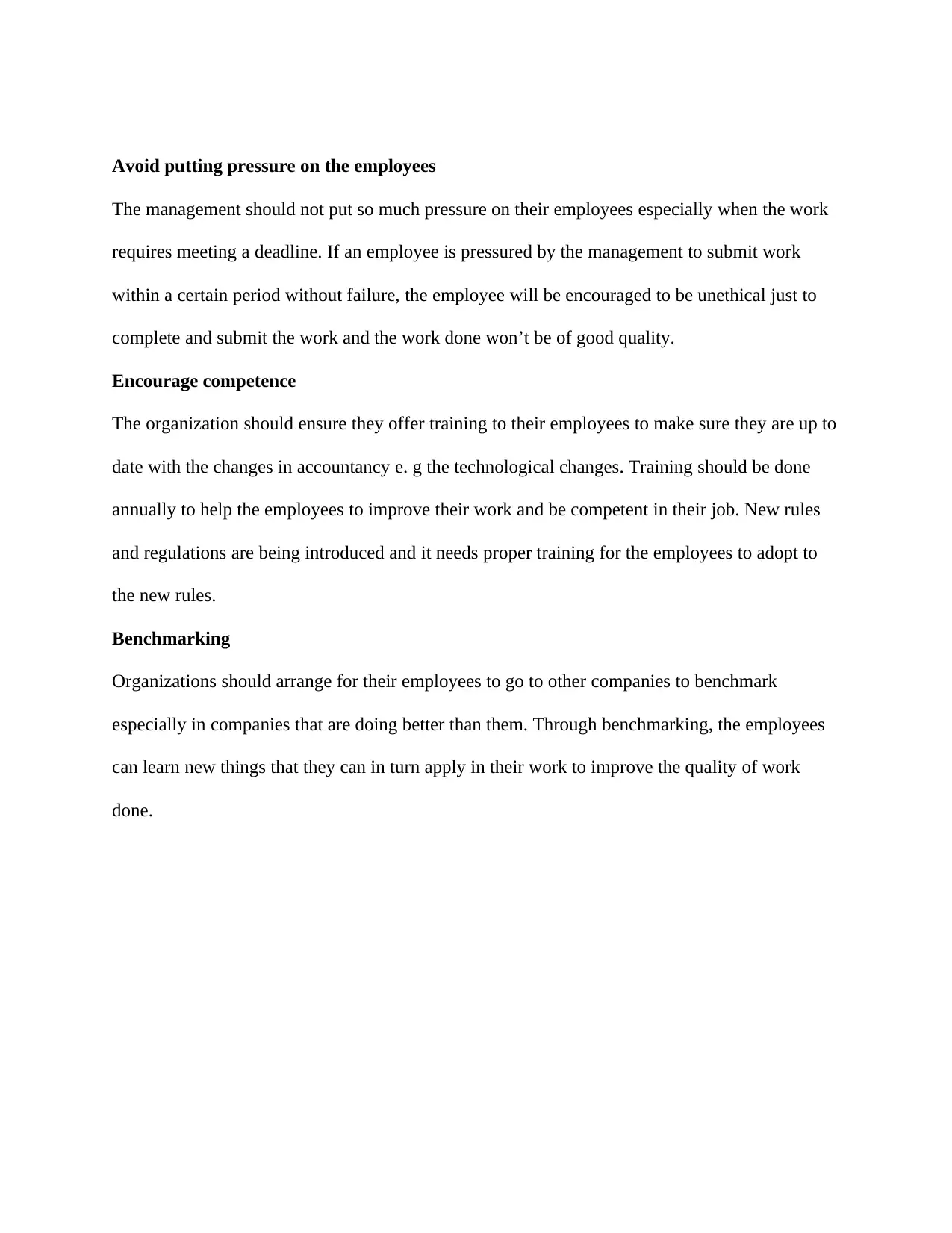
Avoid putting pressure on the employees
The management should not put so much pressure on their employees especially when the work
requires meeting a deadline. If an employee is pressured by the management to submit work
within a certain period without failure, the employee will be encouraged to be unethical just to
complete and submit the work and the work done won’t be of good quality.
Encourage competence
The organization should ensure they offer training to their employees to make sure they are up to
date with the changes in accountancy e. g the technological changes. Training should be done
annually to help the employees to improve their work and be competent in their job. New rules
and regulations are being introduced and it needs proper training for the employees to adopt to
the new rules.
Benchmarking
Organizations should arrange for their employees to go to other companies to benchmark
especially in companies that are doing better than them. Through benchmarking, the employees
can learn new things that they can in turn apply in their work to improve the quality of work
done.
The management should not put so much pressure on their employees especially when the work
requires meeting a deadline. If an employee is pressured by the management to submit work
within a certain period without failure, the employee will be encouraged to be unethical just to
complete and submit the work and the work done won’t be of good quality.
Encourage competence
The organization should ensure they offer training to their employees to make sure they are up to
date with the changes in accountancy e. g the technological changes. Training should be done
annually to help the employees to improve their work and be competent in their job. New rules
and regulations are being introduced and it needs proper training for the employees to adopt to
the new rules.
Benchmarking
Organizations should arrange for their employees to go to other companies to benchmark
especially in companies that are doing better than them. Through benchmarking, the employees
can learn new things that they can in turn apply in their work to improve the quality of work
done.
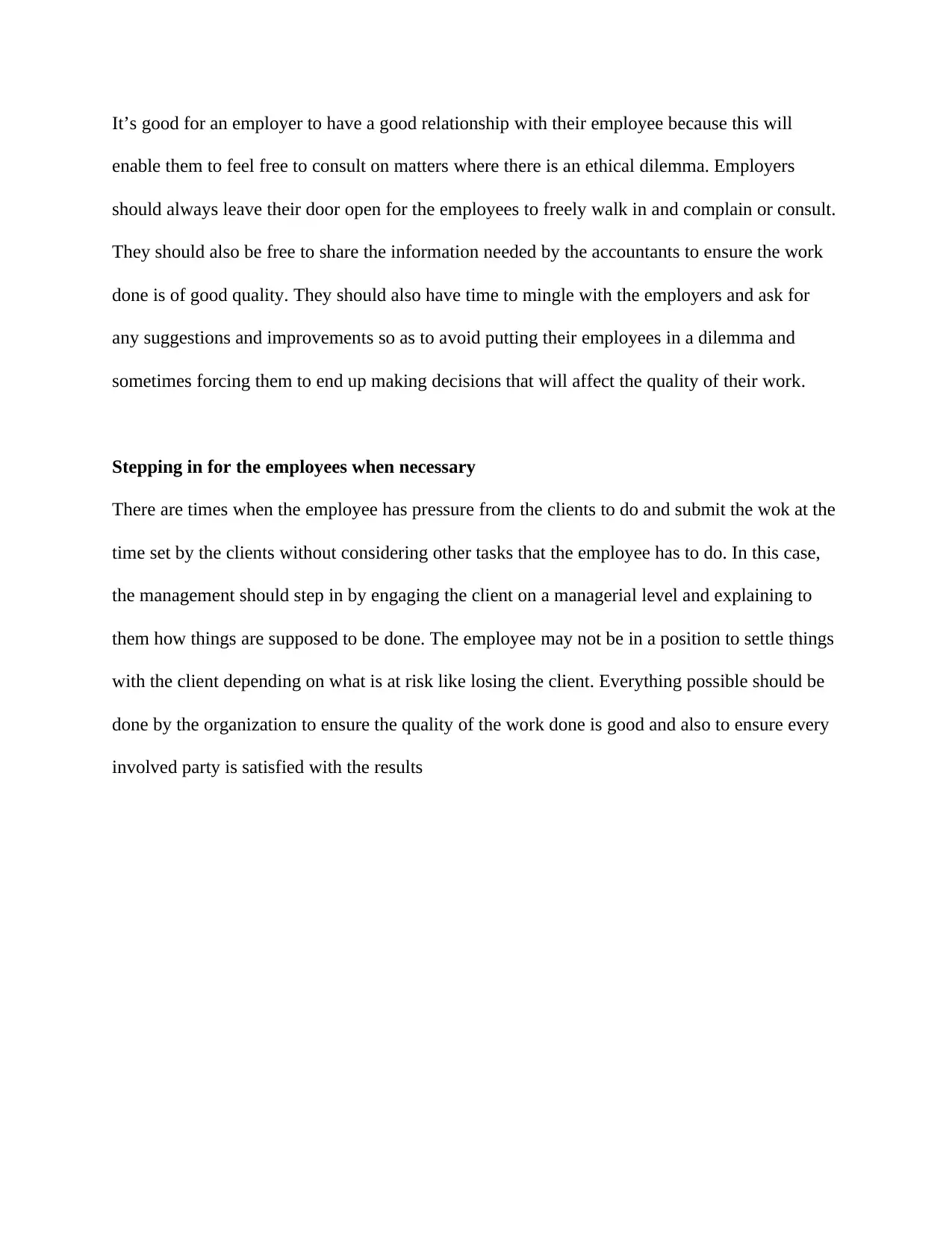
It’s good for an employer to have a good relationship with their employee because this will
enable them to feel free to consult on matters where there is an ethical dilemma. Employers
should always leave their door open for the employees to freely walk in and complain or consult.
They should also be free to share the information needed by the accountants to ensure the work
done is of good quality. They should also have time to mingle with the employers and ask for
any suggestions and improvements so as to avoid putting their employees in a dilemma and
sometimes forcing them to end up making decisions that will affect the quality of their work.
Stepping in for the employees when necessary
There are times when the employee has pressure from the clients to do and submit the wok at the
time set by the clients without considering other tasks that the employee has to do. In this case,
the management should step in by engaging the client on a managerial level and explaining to
them how things are supposed to be done. The employee may not be in a position to settle things
with the client depending on what is at risk like losing the client. Everything possible should be
done by the organization to ensure the quality of the work done is good and also to ensure every
involved party is satisfied with the results
enable them to feel free to consult on matters where there is an ethical dilemma. Employers
should always leave their door open for the employees to freely walk in and complain or consult.
They should also be free to share the information needed by the accountants to ensure the work
done is of good quality. They should also have time to mingle with the employers and ask for
any suggestions and improvements so as to avoid putting their employees in a dilemma and
sometimes forcing them to end up making decisions that will affect the quality of their work.
Stepping in for the employees when necessary
There are times when the employee has pressure from the clients to do and submit the wok at the
time set by the clients without considering other tasks that the employee has to do. In this case,
the management should step in by engaging the client on a managerial level and explaining to
them how things are supposed to be done. The employee may not be in a position to settle things
with the client depending on what is at risk like losing the client. Everything possible should be
done by the organization to ensure the quality of the work done is good and also to ensure every
involved party is satisfied with the results
⊘ This is a preview!⊘
Do you want full access?
Subscribe today to unlock all pages.

Trusted by 1+ million students worldwide
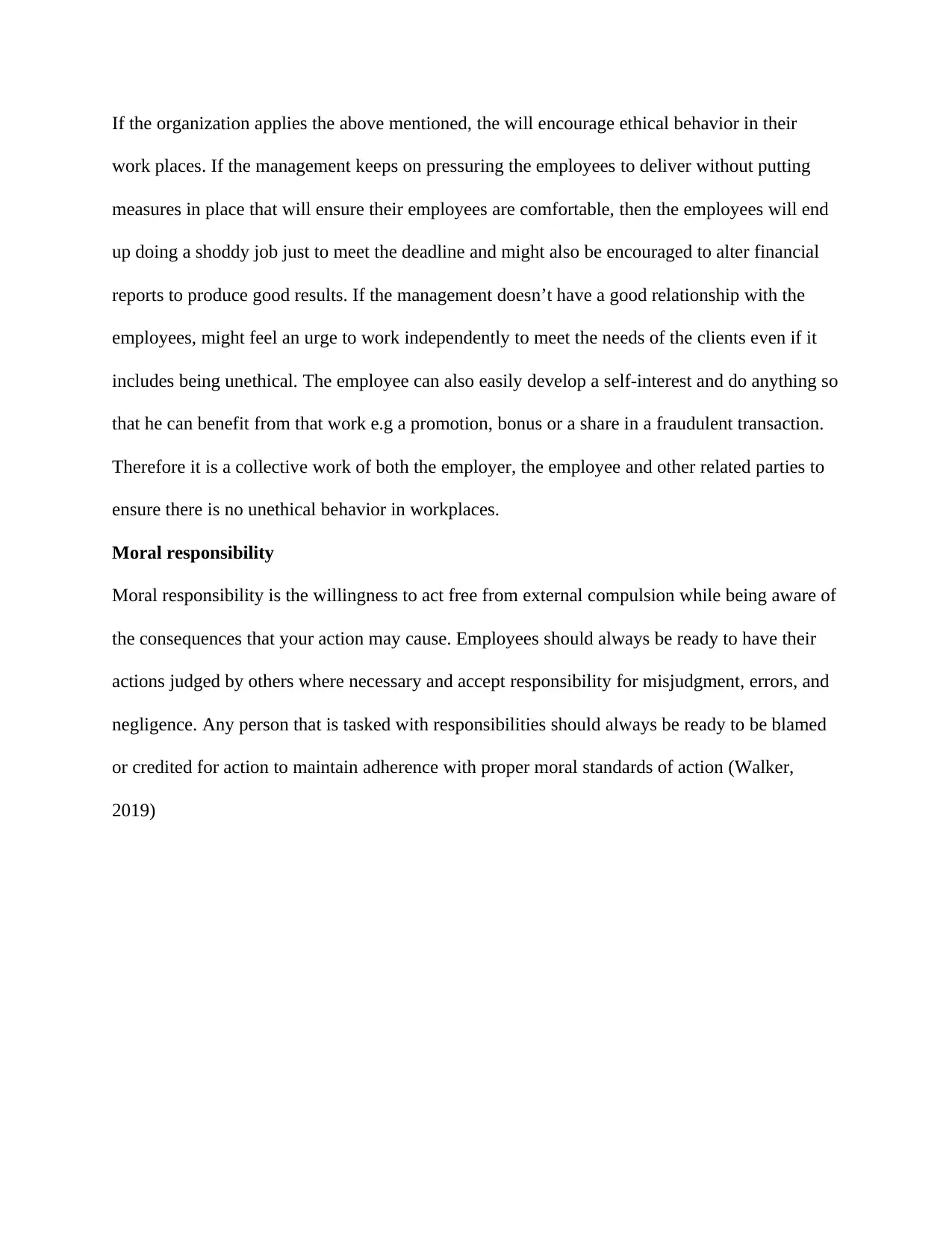
If the organization applies the above mentioned, the will encourage ethical behavior in their
work places. If the management keeps on pressuring the employees to deliver without putting
measures in place that will ensure their employees are comfortable, then the employees will end
up doing a shoddy job just to meet the deadline and might also be encouraged to alter financial
reports to produce good results. If the management doesn’t have a good relationship with the
employees, might feel an urge to work independently to meet the needs of the clients even if it
includes being unethical. The employee can also easily develop a self-interest and do anything so
that he can benefit from that work e.g a promotion, bonus or a share in a fraudulent transaction.
Therefore it is a collective work of both the employer, the employee and other related parties to
ensure there is no unethical behavior in workplaces.
Moral responsibility
Moral responsibility is the willingness to act free from external compulsion while being aware of
the consequences that your action may cause. Employees should always be ready to have their
actions judged by others where necessary and accept responsibility for misjudgment, errors, and
negligence. Any person that is tasked with responsibilities should always be ready to be blamed
or credited for action to maintain adherence with proper moral standards of action (Walker,
2019)
work places. If the management keeps on pressuring the employees to deliver without putting
measures in place that will ensure their employees are comfortable, then the employees will end
up doing a shoddy job just to meet the deadline and might also be encouraged to alter financial
reports to produce good results. If the management doesn’t have a good relationship with the
employees, might feel an urge to work independently to meet the needs of the clients even if it
includes being unethical. The employee can also easily develop a self-interest and do anything so
that he can benefit from that work e.g a promotion, bonus or a share in a fraudulent transaction.
Therefore it is a collective work of both the employer, the employee and other related parties to
ensure there is no unethical behavior in workplaces.
Moral responsibility
Moral responsibility is the willingness to act free from external compulsion while being aware of
the consequences that your action may cause. Employees should always be ready to have their
actions judged by others where necessary and accept responsibility for misjudgment, errors, and
negligence. Any person that is tasked with responsibilities should always be ready to be blamed
or credited for action to maintain adherence with proper moral standards of action (Walker,
2019)
Paraphrase This Document
Need a fresh take? Get an instant paraphrase of this document with our AI Paraphraser
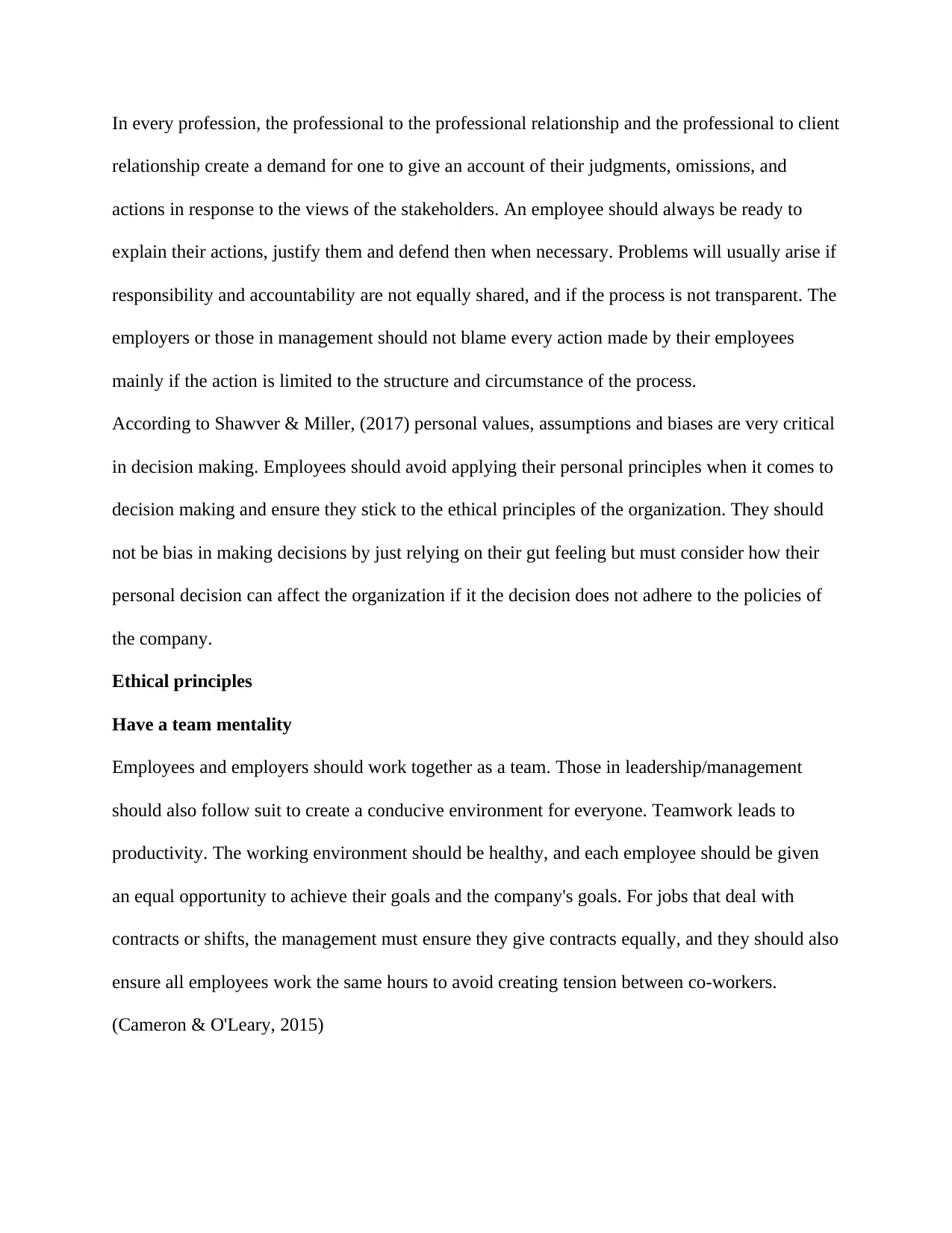
In every profession, the professional to the professional relationship and the professional to client
relationship create a demand for one to give an account of their judgments, omissions, and
actions in response to the views of the stakeholders. An employee should always be ready to
explain their actions, justify them and defend then when necessary. Problems will usually arise if
responsibility and accountability are not equally shared, and if the process is not transparent. The
employers or those in management should not blame every action made by their employees
mainly if the action is limited to the structure and circumstance of the process.
According to Shawver & Miller, (2017) personal values, assumptions and biases are very critical
in decision making. Employees should avoid applying their personal principles when it comes to
decision making and ensure they stick to the ethical principles of the organization. They should
not be bias in making decisions by just relying on their gut feeling but must consider how their
personal decision can affect the organization if it the decision does not adhere to the policies of
the company.
Ethical principles
Have a team mentality
Employees and employers should work together as a team. Those in leadership/management
should also follow suit to create a conducive environment for everyone. Teamwork leads to
productivity. The working environment should be healthy, and each employee should be given
an equal opportunity to achieve their goals and the company's goals. For jobs that deal with
contracts or shifts, the management must ensure they give contracts equally, and they should also
ensure all employees work the same hours to avoid creating tension between co-workers.
(Cameron & O'Leary, 2015)
relationship create a demand for one to give an account of their judgments, omissions, and
actions in response to the views of the stakeholders. An employee should always be ready to
explain their actions, justify them and defend then when necessary. Problems will usually arise if
responsibility and accountability are not equally shared, and if the process is not transparent. The
employers or those in management should not blame every action made by their employees
mainly if the action is limited to the structure and circumstance of the process.
According to Shawver & Miller, (2017) personal values, assumptions and biases are very critical
in decision making. Employees should avoid applying their personal principles when it comes to
decision making and ensure they stick to the ethical principles of the organization. They should
not be bias in making decisions by just relying on their gut feeling but must consider how their
personal decision can affect the organization if it the decision does not adhere to the policies of
the company.
Ethical principles
Have a team mentality
Employees and employers should work together as a team. Those in leadership/management
should also follow suit to create a conducive environment for everyone. Teamwork leads to
productivity. The working environment should be healthy, and each employee should be given
an equal opportunity to achieve their goals and the company's goals. For jobs that deal with
contracts or shifts, the management must ensure they give contracts equally, and they should also
ensure all employees work the same hours to avoid creating tension between co-workers.
(Cameron & O'Leary, 2015)
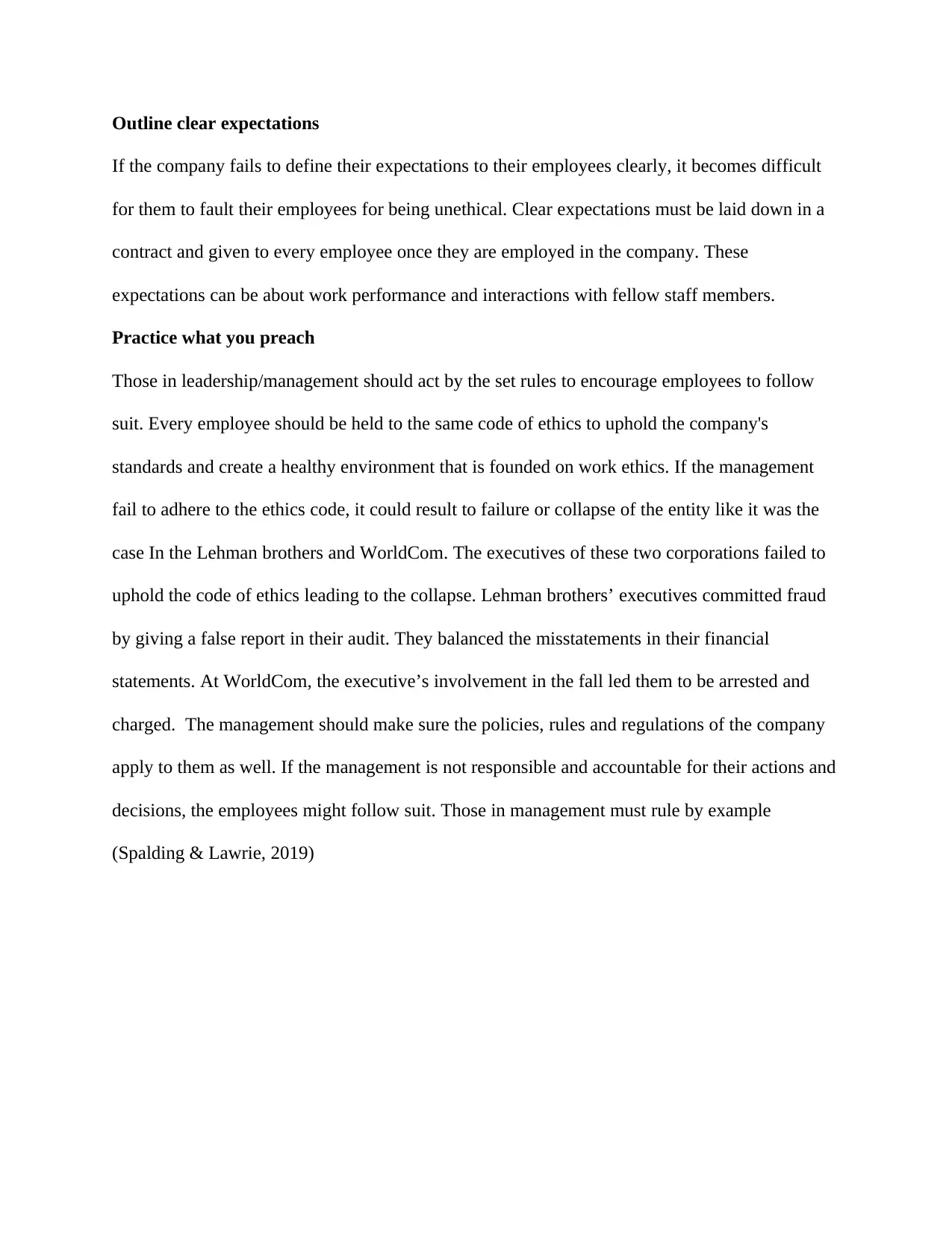
Outline clear expectations
If the company fails to define their expectations to their employees clearly, it becomes difficult
for them to fault their employees for being unethical. Clear expectations must be laid down in a
contract and given to every employee once they are employed in the company. These
expectations can be about work performance and interactions with fellow staff members.
Practice what you preach
Those in leadership/management should act by the set rules to encourage employees to follow
suit. Every employee should be held to the same code of ethics to uphold the company's
standards and create a healthy environment that is founded on work ethics. If the management
fail to adhere to the ethics code, it could result to failure or collapse of the entity like it was the
case In the Lehman brothers and WorldCom. The executives of these two corporations failed to
uphold the code of ethics leading to the collapse. Lehman brothers’ executives committed fraud
by giving a false report in their audit. They balanced the misstatements in their financial
statements. At WorldCom, the executive’s involvement in the fall led them to be arrested and
charged. The management should make sure the policies, rules and regulations of the company
apply to them as well. If the management is not responsible and accountable for their actions and
decisions, the employees might follow suit. Those in management must rule by example
(Spalding & Lawrie, 2019)
If the company fails to define their expectations to their employees clearly, it becomes difficult
for them to fault their employees for being unethical. Clear expectations must be laid down in a
contract and given to every employee once they are employed in the company. These
expectations can be about work performance and interactions with fellow staff members.
Practice what you preach
Those in leadership/management should act by the set rules to encourage employees to follow
suit. Every employee should be held to the same code of ethics to uphold the company's
standards and create a healthy environment that is founded on work ethics. If the management
fail to adhere to the ethics code, it could result to failure or collapse of the entity like it was the
case In the Lehman brothers and WorldCom. The executives of these two corporations failed to
uphold the code of ethics leading to the collapse. Lehman brothers’ executives committed fraud
by giving a false report in their audit. They balanced the misstatements in their financial
statements. At WorldCom, the executive’s involvement in the fall led them to be arrested and
charged. The management should make sure the policies, rules and regulations of the company
apply to them as well. If the management is not responsible and accountable for their actions and
decisions, the employees might follow suit. Those in management must rule by example
(Spalding & Lawrie, 2019)
⊘ This is a preview!⊘
Do you want full access?
Subscribe today to unlock all pages.

Trusted by 1+ million students worldwide
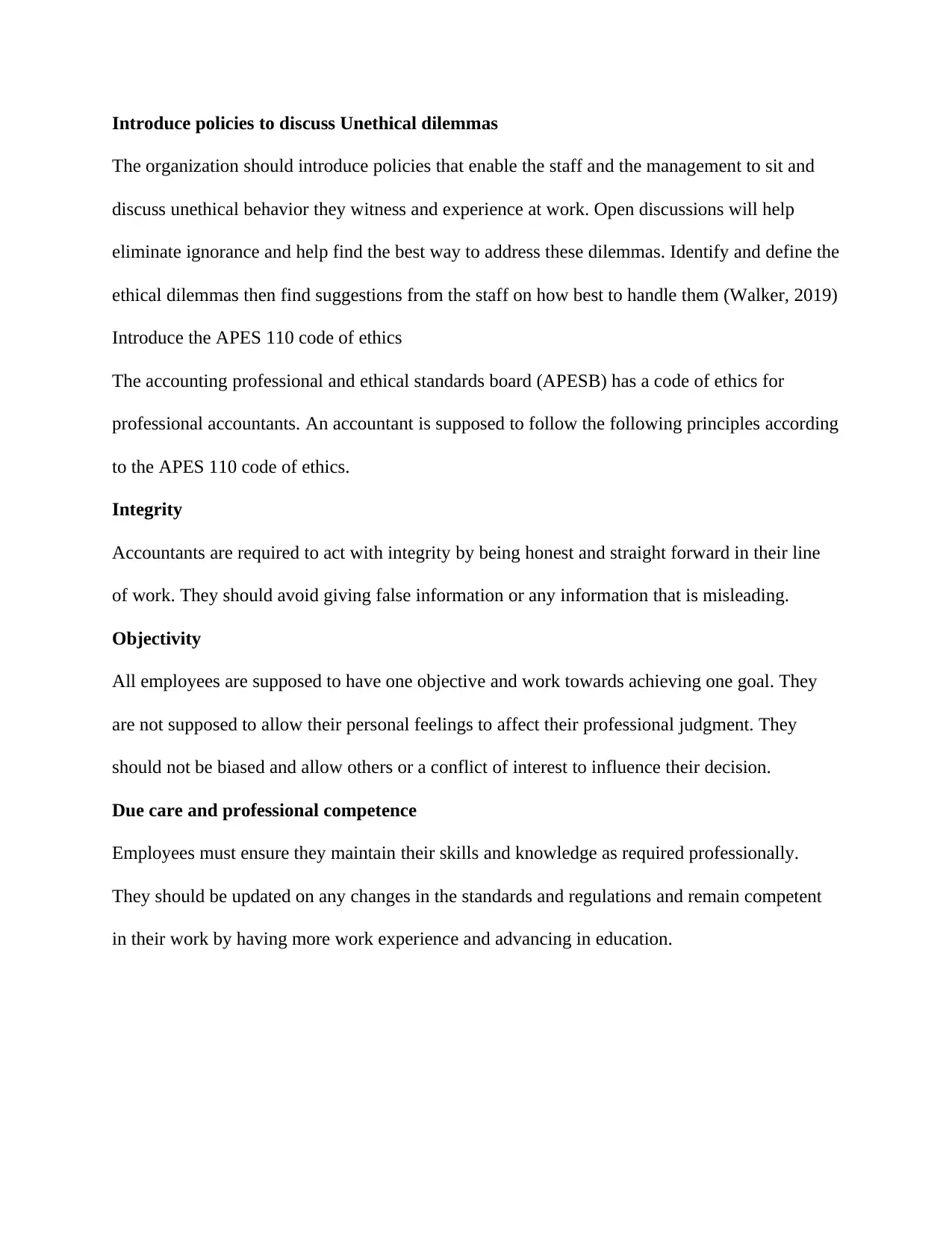
Introduce policies to discuss Unethical dilemmas
The organization should introduce policies that enable the staff and the management to sit and
discuss unethical behavior they witness and experience at work. Open discussions will help
eliminate ignorance and help find the best way to address these dilemmas. Identify and define the
ethical dilemmas then find suggestions from the staff on how best to handle them (Walker, 2019)
Introduce the APES 110 code of ethics
The accounting professional and ethical standards board (APESB) has a code of ethics for
professional accountants. An accountant is supposed to follow the following principles according
to the APES 110 code of ethics.
Integrity
Accountants are required to act with integrity by being honest and straight forward in their line
of work. They should avoid giving false information or any information that is misleading.
Objectivity
All employees are supposed to have one objective and work towards achieving one goal. They
are not supposed to allow their personal feelings to affect their professional judgment. They
should not be biased and allow others or a conflict of interest to influence their decision.
Due care and professional competence
Employees must ensure they maintain their skills and knowledge as required professionally.
They should be updated on any changes in the standards and regulations and remain competent
in their work by having more work experience and advancing in education.
The organization should introduce policies that enable the staff and the management to sit and
discuss unethical behavior they witness and experience at work. Open discussions will help
eliminate ignorance and help find the best way to address these dilemmas. Identify and define the
ethical dilemmas then find suggestions from the staff on how best to handle them (Walker, 2019)
Introduce the APES 110 code of ethics
The accounting professional and ethical standards board (APESB) has a code of ethics for
professional accountants. An accountant is supposed to follow the following principles according
to the APES 110 code of ethics.
Integrity
Accountants are required to act with integrity by being honest and straight forward in their line
of work. They should avoid giving false information or any information that is misleading.
Objectivity
All employees are supposed to have one objective and work towards achieving one goal. They
are not supposed to allow their personal feelings to affect their professional judgment. They
should not be biased and allow others or a conflict of interest to influence their decision.
Due care and professional competence
Employees must ensure they maintain their skills and knowledge as required professionally.
They should be updated on any changes in the standards and regulations and remain competent
in their work by having more work experience and advancing in education.
Paraphrase This Document
Need a fresh take? Get an instant paraphrase of this document with our AI Paraphraser
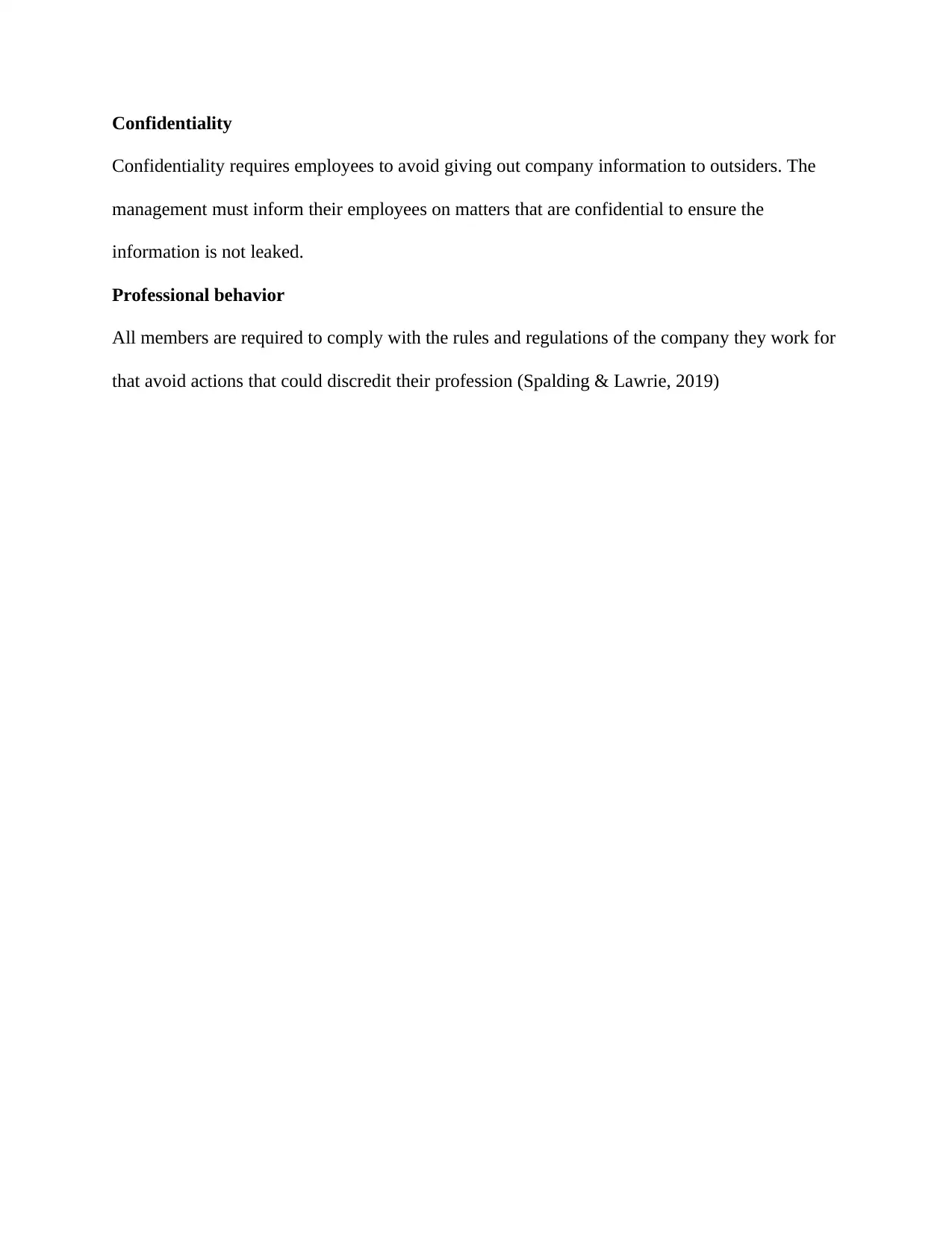
Confidentiality
Confidentiality requires employees to avoid giving out company information to outsiders. The
management must inform their employees on matters that are confidential to ensure the
information is not leaked.
Professional behavior
All members are required to comply with the rules and regulations of the company they work for
that avoid actions that could discredit their profession (Spalding & Lawrie, 2019)
Confidentiality requires employees to avoid giving out company information to outsiders. The
management must inform their employees on matters that are confidential to ensure the
information is not leaked.
Professional behavior
All members are required to comply with the rules and regulations of the company they work for
that avoid actions that could discredit their profession (Spalding & Lawrie, 2019)
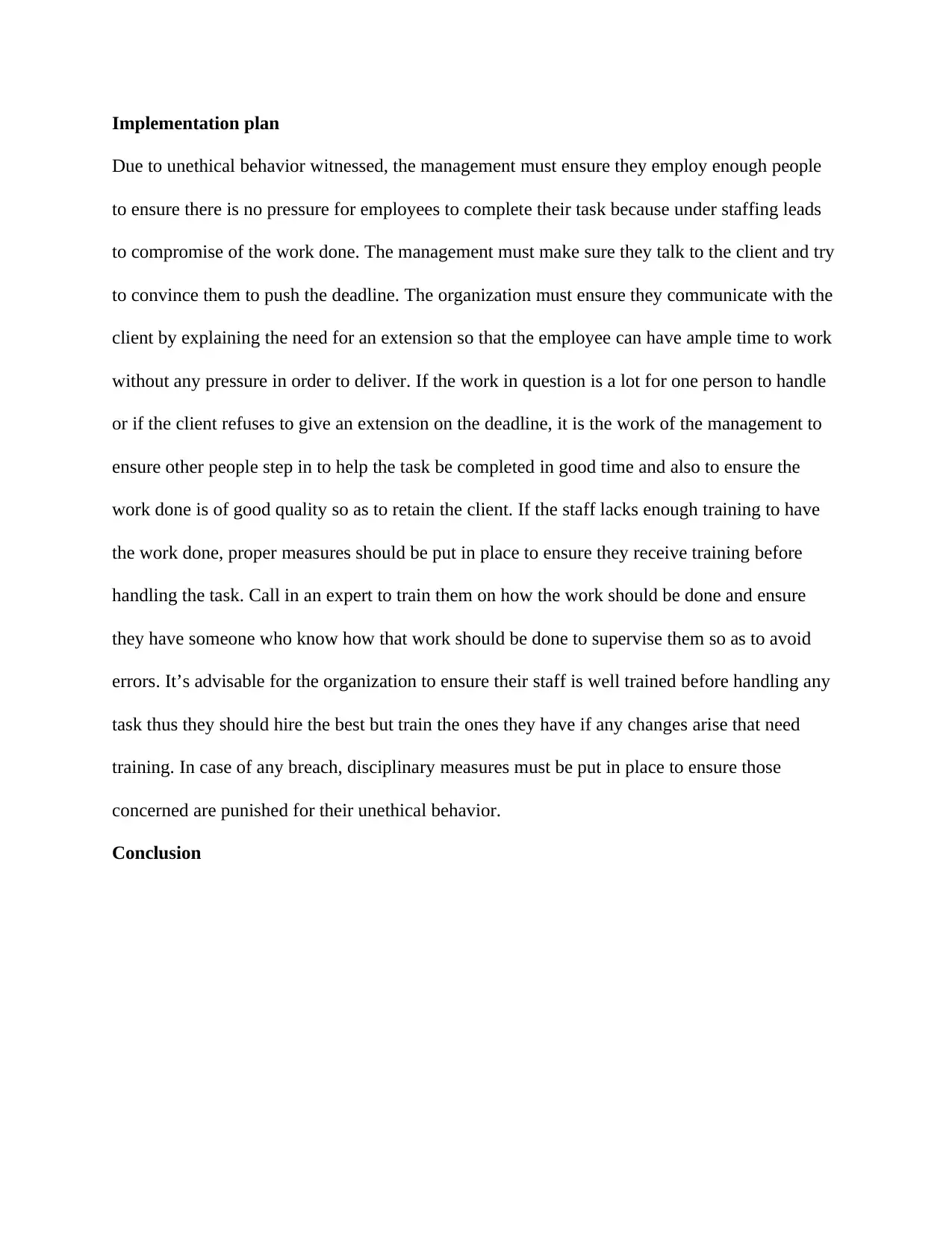
Implementation plan
Due to unethical behavior witnessed, the management must ensure they employ enough people
to ensure there is no pressure for employees to complete their task because under staffing leads
to compromise of the work done. The management must make sure they talk to the client and try
to convince them to push the deadline. The organization must ensure they communicate with the
client by explaining the need for an extension so that the employee can have ample time to work
without any pressure in order to deliver. If the work in question is a lot for one person to handle
or if the client refuses to give an extension on the deadline, it is the work of the management to
ensure other people step in to help the task be completed in good time and also to ensure the
work done is of good quality so as to retain the client. If the staff lacks enough training to have
the work done, proper measures should be put in place to ensure they receive training before
handling the task. Call in an expert to train them on how the work should be done and ensure
they have someone who know how that work should be done to supervise them so as to avoid
errors. It’s advisable for the organization to ensure their staff is well trained before handling any
task thus they should hire the best but train the ones they have if any changes arise that need
training. In case of any breach, disciplinary measures must be put in place to ensure those
concerned are punished for their unethical behavior.
Conclusion
Due to unethical behavior witnessed, the management must ensure they employ enough people
to ensure there is no pressure for employees to complete their task because under staffing leads
to compromise of the work done. The management must make sure they talk to the client and try
to convince them to push the deadline. The organization must ensure they communicate with the
client by explaining the need for an extension so that the employee can have ample time to work
without any pressure in order to deliver. If the work in question is a lot for one person to handle
or if the client refuses to give an extension on the deadline, it is the work of the management to
ensure other people step in to help the task be completed in good time and also to ensure the
work done is of good quality so as to retain the client. If the staff lacks enough training to have
the work done, proper measures should be put in place to ensure they receive training before
handling the task. Call in an expert to train them on how the work should be done and ensure
they have someone who know how that work should be done to supervise them so as to avoid
errors. It’s advisable for the organization to ensure their staff is well trained before handling any
task thus they should hire the best but train the ones they have if any changes arise that need
training. In case of any breach, disciplinary measures must be put in place to ensure those
concerned are punished for their unethical behavior.
Conclusion
⊘ This is a preview!⊘
Do you want full access?
Subscribe today to unlock all pages.

Trusted by 1+ million students worldwide
1 out of 14
Related Documents
Your All-in-One AI-Powered Toolkit for Academic Success.
+13062052269
info@desklib.com
Available 24*7 on WhatsApp / Email
![[object Object]](/_next/static/media/star-bottom.7253800d.svg)
Unlock your academic potential
Copyright © 2020–2026 A2Z Services. All Rights Reserved. Developed and managed by ZUCOL.





